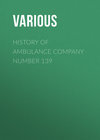Читать книгу: «History of Ambulance Company Number 139», страница 9
Что-то пошло не так, попробуйте зайти позже
Покупайте книги и получайте бонусы в Литрес, Читай-городе и Буквоеде.
Участвовать в бонусной программеВозрастное ограничение:
12+Дата выхода на Литрес:
30 ноября 2017Объем:
143 стр. 22 иллюстрацииПравообладатель:
Public Domain




















